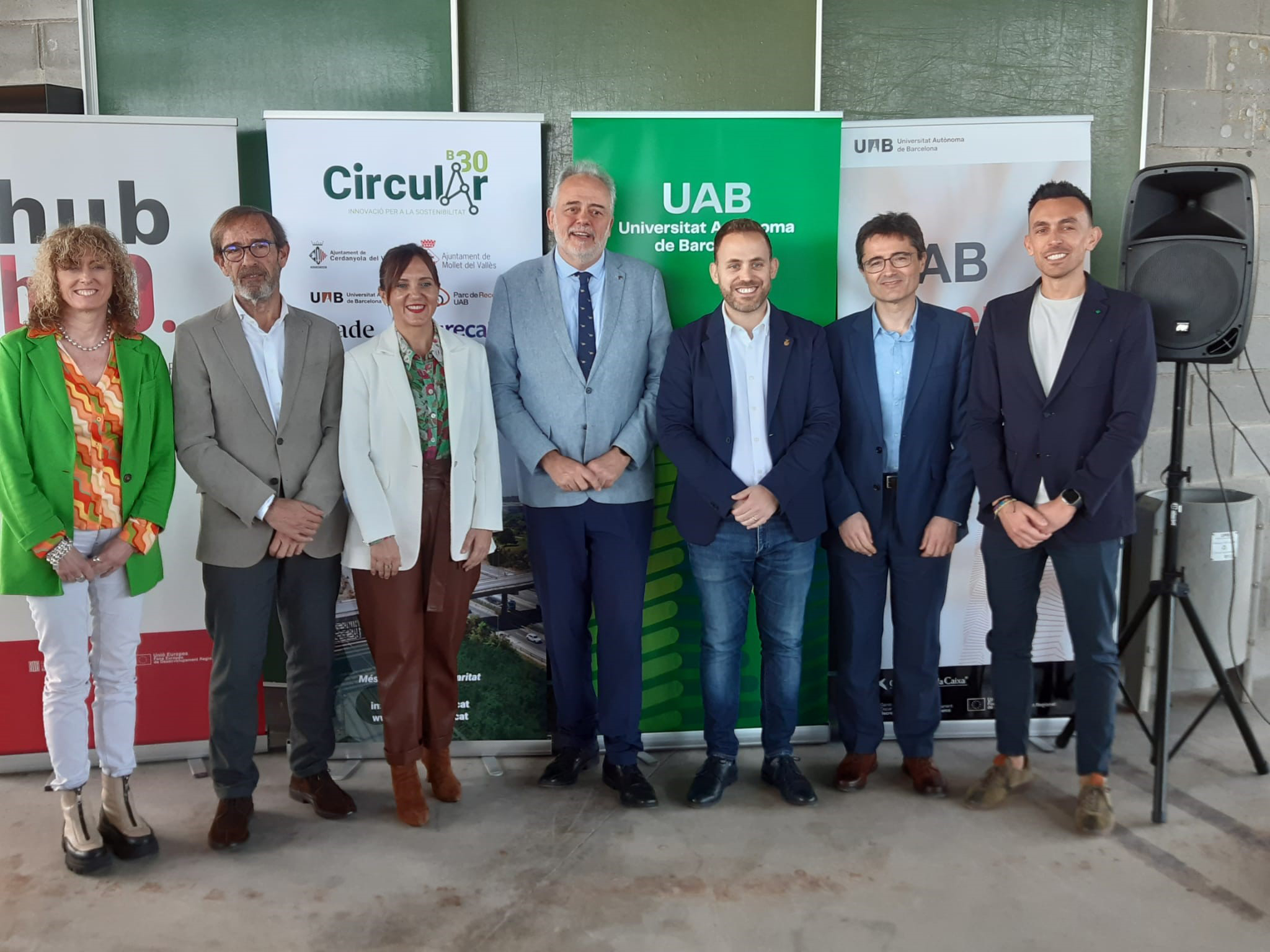Circular B30 makes the Mollet-Cerdanyola axis a benchmark for progress in research and innovation towards the goal of zero waste in the region
The UAB played host to the presentation of the results of the regional specialisation and competitiveness project (PECT) "HubB30: Beyond Circularity", Circular B30, of the Mollet-Cerdanyola axis which was launched in 2021 and is coordinated by the Cerdanyola City Council. Among these results is the creation of a network of laboratories for universities, research centres, administrations, companies and citizens to work together on sustainability. One of these laboratories, Circulab, involves the transformation of the campus waste and recycling centre into a new space for innovation in the practice of circular economy and eco-design.

The event was attended by the heads of the project's partner institutions and organisations: Carlos Cordón, mayor of Cerdanyola del Vallès, Mireia Dionisio, mayoress of Mollet del Vallès, Javier Lafuente, rector of the UAB and president of the Parc de Recerca UAB, Xavier López, chief operating and corporate officer of EURECAT, and Joan Rodon Modol, dean of the Esade Business School.
Under the Circular B30 brand, the project has set the necessary actions to carry out initiatives for economic and sustainable transformation towards the goal of zero waste in the region. The B30 area generates almost half of the industrial waste in the province of Barcelona and a quarter of all of Catalonia.
The proposal is based on the concept of research and open innovation to address many of the area's challenges identified as priorities in terms of sustainability. This vision encourages co-creation and collaboration between different social actors: citizens and users, research personnel, social entities, public authorities, the business sector, the creative sector and entrepreneurs.
"We think this is the way forward if we want to multiply the transformative capacity and social impact of the different agents and sectors involved," said Rector Javier Lafuente in his speech. In the same vein, the rector of the UAB said he was convinced that "we are moving towards a more responsible and sustainable conception of innovation and entrepreneurship as drivers of progress and social transformation, and this project is a magnificent example of this approach".
Network of open innovation labs: B30 Open Labs
The project has enabled the creation of a network of open innovation laboratories, the B30 Open Labs, at the UAB, Mollet del Vallès and Cerdanyola del Vallès, to act as catalysts in changing the current model of production and consumption in the region for another based on a green and circular economy.
At the UAB, the Circulab, inaugurated today, will allow innovation in the practice of circular economy and eco-design at the waste disposal and recycling centre of the Bellaterra campus. Integrated in the Open Labs network of the University, it will facilitate processes of repair, exchange and reuse or transformation and revaluation of resources, and will generate knowledge in collaboration with society through processes of innovation, training and entrepreneurship. The new equipment has involved the transformation of the waste disposal and recycling centre, which has been renovated with sustainable materials, and a renaturalised and energetically self-sufficient environment.
The Mollet HUB aims to bring added value to the region with policies of innovation, waste reduction and improved competitiveness to facilitate business modernisation, the creation of new businesses and the promotion of entrepreneurship and self-employment. In addition, it will promote interaction between all town agents and encourage the participation of citizens in the development of innovative projects and prototypes, with training and knowledge in 4.0 technologies.
Finally, the civic Open Lab Espai Altimira de Cerdanyola will promote the generation of ideas and collaboration, and will identify municipal challenges, responding through innovation and co-creation processes with its citizens.
A shared agenda for research and entrepreneurship in the circular economy
In addition to the B30 Open Labs, Circular B30 partners have worked on different strands throughout the project.
The UAB and the Parc de Recerca UAB established the basis for a shared agenda among all members. With the organisation of participatory workshops, they have drawn up a map of initiatives in the region, both from the public and private sectors, related to circular economies. In addition, they identified the challenges from which to work and find answers, through two editions of the Generating Ideas Programme.
The EURECAT technology centre worked in the field of technology knowledge transfer with the HUBB30 Waste 0 Observatory, developing tasks of technology watch and innovative strategic foresight on current trends and advances that can be transferred to companies in the industry of the area and to the public. It also created a self-diagnosis tool to assess the state of small and medium-sized companies and offer recommendations for technologies aimed at fostering the search for talent.
In addition, Esade, through the Esade Entrepreneurship Institute and the Esade Centre for Social Impact, has focused its activity on promoting entrepreneurship with the Zero Waste Accelerator programme, the creation of a community of students for the detection of initiatives, and hackathons to respond to the challenges posed.
The actions carried out in the project included a budget of almost 4 million euros, of which 50% was co-financed through the budgets of the Government of Catalonia, under the framework of the ERDF Operational Programme 2014-2020 selected project.
All this work will make the B30 Mollet-Cerdanyola axis a circular, innovative and inclusive region, which will also act as a lever of change for other areas.
CircularB30 website: www.circularb30.cat
The UAB, with Sustainable Development Goals
Industry, innovation and infrastructure
Sustainable cities and communities